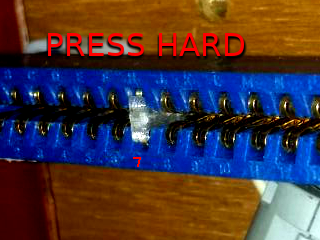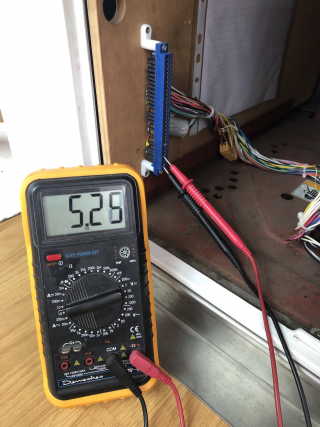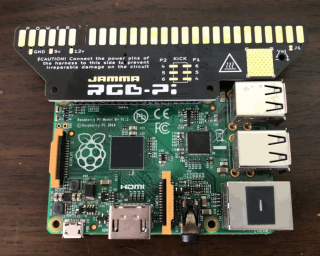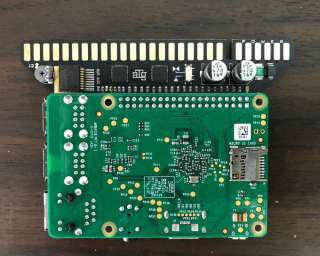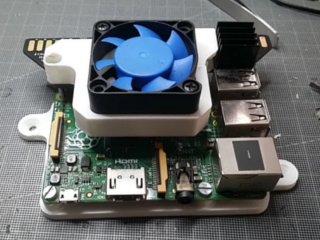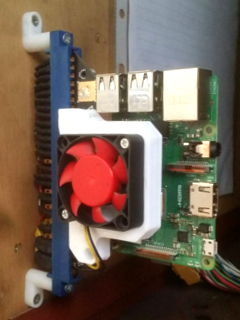Difference between revisions of "RGB-Pi JAMMA Installation"
| Line 6: | Line 6: | ||
[[File:T.png|320px|border]][[File:Tjamma.png|320px|border]] | [[File:T.png|320px|border]][[File:Tjamma.png|320px|border]] | ||
|- | |- | ||
| − | |2. With the RGB-Pi board still '''DISCONNECTED''', turn on the cabinet and adjust the voltage in pin 3 to 5.25v | + | |2. With the RGB-Pi board still '''DISCONNECTED''', turn on the cabinet and adjust the voltage in pin 3 to 5.25v, also check if your machine has a coin counter or electronic purse on pin 16 & T, if this pin gives voltage this can damage the rgb-pi board, disconnect the power of the coin purse or counter or replace it with a button. |
[[File:tester.png|320px|border]] | [[File:tester.png|320px|border]] | ||
|- | |- | ||
Revision as of 17:36, 1 July 2020
Steps
| 1. DO NOT SKIP THIS STEP. Insert the ┳ piece in pin 7 of the female JAMMA harness |
| 2. With the RGB-Pi board still DISCONNECTED, turn on the cabinet and adjust the voltage in pin 3 to 5.25v, also check if your machine has a coin counter or electronic purse on pin 16 & T, if this pin gives voltage this can damage the rgb-pi board, disconnect the power of the coin purse or counter or replace it with a button. |
| 3. Connect the RGB-Pi board to the Raspberry with the JAMMA connector facing to the outside of the Raspberry Pi |
| 4. If you are going to use a high volume level, you must add a heatsink like the used for the CPU of the Pi in the golden square indicated with the heat symbol, if your volume level is low and you do not notice heating in this square or you are using it [a cooling system with fan ]does not need to be used. |
| 5. WITH THE MACHINE OFF connect the JAMMA RGB-Pi to the arcade cabinet. DO NOT PLUG ANY USB POWER ADAPTER TO THE RASPBERRY PI |
| 6. That's all! For instructions on how to install RGB-Pi OS, please visit the corresponding section in this wiki. |
JAMMA RGB-Pi Pinout Serie4
JAMMA / MVS ┏━━━━━━━━━━━━━━━━━┳━━━━━━━━━━━━━━━━━┓ ┃GND A┃1 GND┃ ┃GND B┃2 GND┃ ┃+5V C┃3 +5v┃ ┃+5v D┃4 +5v┃ ┃ E┃5 ┃ ┃+12v F┃6 +12v┃ ┃Key H┃7 Key┃ ┃ J┃8 ┃ ┃ K┃9 ┃ ┃Speaker - or L L┃10 Speaker + or R┃ ┃P1 Button7 M┃11 ┃ ┃Video GREEN N┃12 VideoRED┃ ┃Video SYNC P┃13 VideoBLUE┃ ┃P2 Button 7 R┃14 VideoGND┃ ┃ S┃15 Button7 P1┃ ┃P2 Coin T┃16 Coin P1┃ ┃P2 Start U┃17 Start P1┃ ┃P2 Up V┃18 Up P1┃ ┃P2 Down W┃19 Down P1┃ ┃P2 Left X┃20 Left P1┃ ┃P2 Right Y┃21 Right P1┃ ┃P2 Button1 Z┃22 Button1 P1┃ ┃P2 Button2 a┃23 Button2 P1┃ ┃P2 Button3 b┃24 Button3 P1┃ ┃P2 Button4 c┃25 Button4 P1┃ ┃P2 Button5 d┃26 Button5 P1┃ ┃GND/P2 Button6 e┃27 Button6 P1/GND┃ ┃GND f┃28 GND┃ ┗━━━━━━━━━━━━━━━━━┻━━━━━━━━━━━━━━━━━┛ *Pins 10 & L change depending on the position of the stereo/mono switch. For mono use + - and for stereo use R & L and common ground. *Pins 27 & e are connected to GND by default. To enable the same as the 6th button, cut the jumpers JP1 & JP2 on the board.
Kick ┏━━━━━━━━━━━━━━━━━┳━━━━━━━━━━━━━━━━━┓ ┃P2 Button4 4┃6 Button6 P1┃ ┃P2 Button5 5┃5 Button5 P1┃ ┃P2 Button6 6┃4 Button4 P1┃ ┗━━━━━━━━━━━━━━━━━┻━━━━━━━━━━━━━━━━━┛ *Take the ground from any pin of the harness

